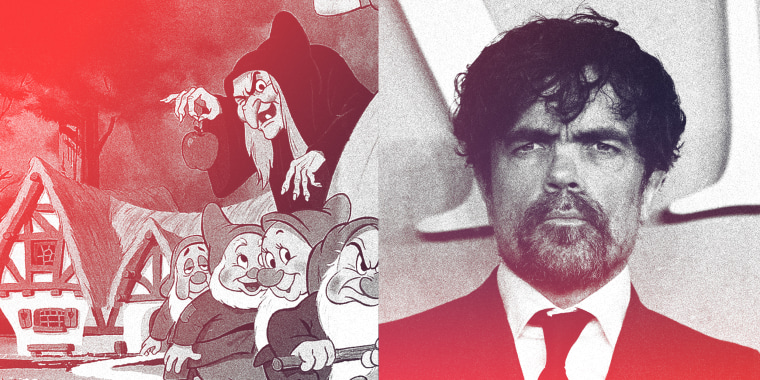Earlier this week, actor Peter Dinklage rightfully lambasted Disney for rebooting the movie “Snow White and the Seven Dwarfs” as a live-action film. Dinklage, who was born with dwarfism and is perhaps best known for his turn as Tyrion Lannister in “Game of Thrones,” was right when he slammed the planned remake despite its novel casting choice for the main character.
Disney said it would consult with the little person community to make sure the new movie isn’t offensive.
“Literally no offense to anyone, but I was a little taken aback when they were very proud to cast a Latina actress as Snow White,” he said. “But you’re still telling the story of ‘Snow White and the Seven Dwarfs.’ Take a step back and look at what you’re doing there. It makes no sense to me.” In response, Disney said it would consult with the little person community to make sure the new movie isn’t offensive.
“To avoid reinforcing stereotypes from the original animated film, we are taking a different approach with these seven characters and have been consulting with members of the dwarfism community,” Disney told The Hollywood Reporter. The statement allows Disney to appear that it is not reinforcing harmful stereotypes about little people and, thus, doing differently than the company did in the past.
But as my friend and fellow MSNBC columnist Julio Ricardo Varela wrote in The Washington Post about the recent remake of "West Side Story," news that some stereotypical portrayals have been removed is a half-hearted victory that doesn’t really feel like a victory at all. I loved “Snow White” as a child, but I have the same opinion about Disney’s planned remake that Varela had about the new “West Side Story,” in that I can’t think of a good reason to retell the story. Not even with a Latina as the main actress. As disability rights activist Rebecca Cokley tweeted, a remake will still likely lead to people making Snow White jokes to little people.
Not only is there no reason for the remake to exist, it has the potential to anger just about everyone. People with disabilities will see it for what it is: a cheap cash grab by Disney, which will likely make only cosmetic adjustments to allow the money to continue to flow, while conservatives will complain that Disney has become too “woke,” whatever the hell that means.
But the bigger problem with trying to make a rehashed “Snow White” palatable for people with disabilities is that it comes at the expense of allowing people with disabilities to create their own stories. Simply giving big marquee names chances to portray disability means actively reallocating money that could be spent giving actors with disabilities a fair shot.
As a disabled movie lover, I find disability representation pitiful, and I’m not alone. As a report from the University of Southern California’s Annenberg Inclusion Initiative found, only 2.3 percent of all speaking characters in the top movies of 2019 had a disability. A report from the Ruderman Family Foundation found that only 12 percent of disabled characters were played by disabled actors. Those two statistics show that people with disabilities get mere crumbs from the entertainment industry.
Those analyses don’t even examine whether those portrayals were worthwhile. Plenty of people with disabilities may feel the disabled characters they see are one-dimensional, tokenized, fetishized or reduced to serving as an inspiration or catalyst for nondisabled characters. At the same time that so many people with disabilities feel abandoned by their government and by a society that wants us to “live with Covid,” the Hollywood that we turn to for escape isn’t doing us any favors, either.
In addition, when people with disabilities push back on harmful portrayals, they are often met with hostility. Consider Sia’s “Music,” her disasterpiece of a movie about autism. On Twitter, she lashed out in response to people with disabilities who said her movie wasn’t helpful and criticized her for not casting autistic people.
But depicting three-dimensional people with disabilities and allowing disabled creators to have control of their narratives would help the entertainment industry beyond just good public relations: It would likely equal good money. The Centers for Disease Control and Prevention says 26 percent of Americans have some kind of disability. They’re consumers, too. And they will watch television shows and movies, even stream them over and over again, that include accurate portrayals of disabled people created by disabled people. This is to say nothing of their loved ones who would also delight to see accurate representations.
Ironically, with "Loop," a 2020 animated short created by Erica Milsom, Disney distributed a Pixar produced film that is one of the best fictional portrayals of autism I have seen. Milsom consulted with autistic people on the front end for the film and cast Madison Bandy, who is autistic, to play the character Renee. Disney has seen and been a part of a fantastic disability production. Similarly, the success of documentaries such as "Crip Camp" show how vibrant the market is for content that honors disabled people.
But in announcing a “Snow White” remake, Disney is demonstrating that it would rather keep mining its old hits for cheap bucks, and, in so doing, dredge up old, hurtful tropes where disabled characters exist only to help a nondisabled person out.
CORRECTION (Feb. 1, 2022, 4:00 PM ET): A previous version of this article misstated who directed the 2021 film "West Side Story." It was Steven Spielberg, not Marc Webb. (Webb will direct the remake of "Snow White.")

